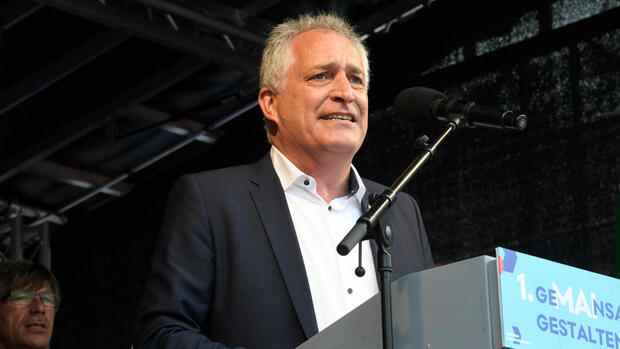“There is no other company that has such a great deal of industry know-how as Siemens,” says Kerner.
(Photo: IMAGO/BeckerBredel)
Munich According to the will of the employee representatives, the technology group Siemens must not become a pure software group. The unique selling point of Siemens is the linking of hardware and software, said Siemens supervisory board member and IG Metall chief cashier Jürgen Kerner in the Munich business press club. “There is no other company that has such a great deal of industry know-how as Siemens.”
CEO Roland Busch had also emphasized that he relied on the combination of software and hardware. In theory, everyone at Siemens agrees on this strategy, Kerner said. But this must also be filled with life. “It is important for us that we also get a signal to the employees that we are investing in hardware.” Siemens has to develop new products, but also look around for acquisitions. “One or the other nice hardware company in Germany and Europe would be a good fit for us.”
It is a “strategic risk” for Siemens that new industries could emerge in which Siemens has no hardware know-how, said Kerner. This could be the chance for new competitors. “The pure software companies also want to get into the machine room of industry. So far, Siemens has been there.”
Under the new CEO Roland Busch, Siemens is developing more and more in the direction of an IT company. The business with software and digital solutions is expected to grow at an annual average rate of double digits over the next few years.
Top jobs of the day
Find the best jobs now and
be notified by email.
In recent years, the group has also often focused on the software sector during takeovers. The group recently took over the US company Brightly, which specializes in software for the operation and maintenance of buildings and energy systems, for 1.6 billion dollars.
Basically, the employees see Siemens on the right course. “We share the strategy,” said General Works Council Chairwoman Birgit Steinborn. After the uncertainty caused by the many conversions in recent years, the mood in the company is good. It is good that Busch is a technology strategist at the helm.
Radical conversion under Kaeser
Predecessor Joe Kaeser had radically restructured the group. He listed medical technology as Healthineers and spun off energy technology as Siemens Energy.
The time of the big spin-offs must now be over, said Kerner. The large business units – the digital industries, intelligent infrastructure, rail technology mobility and the majority stake in Siemens Healthineers should be “inalienable”.
Siemens should not slip below 50 percent in medical technology, which is a “red line” for him. The parent company currently holds 72 percent of the shares. However, there are always investors who call for the participation to be further reduced.
In recent years there has also been repeated speculation that Siemens could separate from the Mobility train division. Kaeser wanted to bring them into a joint venture with Alstom, but the antitrust authorities failed.
Mobility is the best example of Siemens’ ability to connect the digital and real worlds, Kerner said.
(Photo: IMAGO/Rüdiger Wölk)
Mobility is the best example of Siemens’ ability to connect the digital and real worlds, Kerner said. For example, the Munich-based company builds trains, has software for predictive maintenance and supplies signaling technology. In this way it was possible to form the most profitable railway technology provider in the western world.
More: How Siemens wants to attract thousands of customers to its new digital platform Xcelerator.
